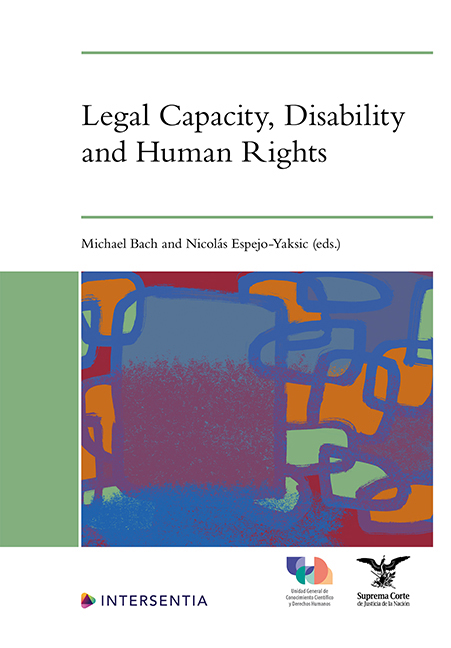Book contents
- Frontmatter
- Foreword
- Acknowledgements
- Contents
- List of Cases
- List of Contributors
- Legal Capacity, Disability and Human Rights: Introduction
- PART I HISTORICAL PERSPECTIVES AND THEORETICAL FRAMES
- PART II LAW REFORM: COUNTRY AND REGIONAL PERSPECTIVES
- PART III LEGAL QUESTIONS, PERSISTENT CHALLENGES
- Index
- About the Editors
Losing Legal Capacity and Power Over Personal Life: The “Decision-Making Capability” Alternative
Published online by Cambridge University Press: 03 April 2024
- Frontmatter
- Foreword
- Acknowledgements
- Contents
- List of Cases
- List of Contributors
- Legal Capacity, Disability and Human Rights: Introduction
- PART I HISTORICAL PERSPECTIVES AND THEORETICAL FRAMES
- PART II LAW REFORM: COUNTRY AND REGIONAL PERSPECTIVES
- PART III LEGAL QUESTIONS, PERSISTENT CHALLENGES
- Index
- About the Editors
Summary
INTRODUCTION
People with intellectual, cognitive, and psychosocial disabilities systematically and routinely lose their legal capacity – or their right to decide – when legal authority is vested in others to make decisions for them through guardianship or substitute decision-making. They also lose power over their lives more informally through everyday paternalism and the structural violence, constraints, institutionalisation, and abuse they experience at hugely disproportionate rates. The assumption that because of their disability some people simply do not have the cognitive abilities to exercise choice and control over their lives, and as a result must be restricted in the name of protection, is at the root of the ableism that pervasively shapes their lives. People with disabilities have been subject to, violated, and harmed by these ableist assumptions for centuries, and they underlie the legal and social justification for restricting or obstructing their right to legal capacity and liberty.
This reality of structural exclusion of so many people with disabilities is in direct conflict with the equal right to exercise legal capacity recognised in Article 12 of the UN Convention on the Rights of Persons with Disabilities (CRPD), on “equal recognition before the law.” Article 12 recognises the right to enjoy and exercise legal capacity on an equal basis with others, with out discrimination based on disability. It also recognises that States parties have an obligation to ensure that people have access to the supports they may require to exercise their legal capacity, based on their rights, will, and preferences.
To develop effective law, policy, and practice responses to recognising and promoting the right to equality in exercise of legal capacity, it is necessary to develop an alternative to the mainstream approaches to legal capacity which justify restrictive and exclusionary legal capacity regimes. This chapter explores a “decision-making capability” approach on which an alternative, more inclusive and universal legal capacity regimes can be built.
LEGAL CAPACITY: MAINSTREAM APPROACHES AND CRITIQUE
MAINSTREAM APPROACHES TO LEGAL CAPACITY
The assumptions and provisions structuring the recognition of legal capacity in most jurisdictions around the world reflect what have been referred to as “mainstream” approaches to defining the requirements for exercising and enjoying legal capacity.
- Type
- Chapter
- Information
- Legal Capacity, Disability and Human Rights , pp. 65 - 88Publisher: IntersentiaPrint publication year: 2023



